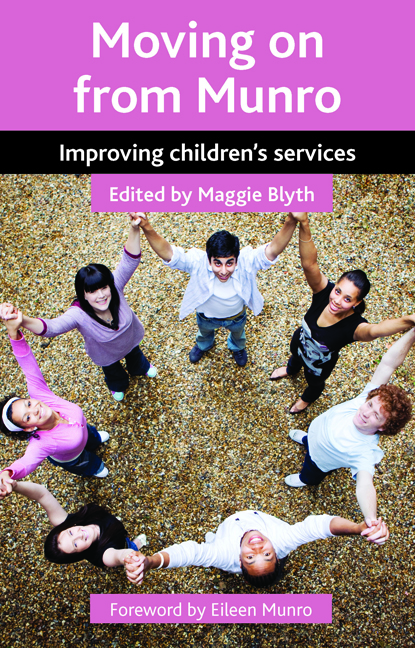Book contents
- Frontmatter
- Contents
- List of abbreviations
- Notes on contributors
- Acknowledgements
- Foreword
- Introduction
- 1 Getting the right things right
- 2 Child protection: 40 years of learning but where next?
- 3 Doing something different: reconfiguring front-line services: opening up the market
- 4 Re-imagining early help: looking forward, looking back
- 5 Children should be seen and heard: understanding the child’s experience
- 6 Responding to adolescent risk: continuing challenges
- 7 Moving on with Munro: child sexual exploitation within a child protection framework
- 8 Missing children post-Munro
- 9 Symbolic half-measures? On local safeguarding children boards, their contributions and challenges
- Conclusion
- Index
3 - Doing something different: reconfiguring front-line services: opening up the market
Published online by Cambridge University Press: 03 February 2022
- Frontmatter
- Contents
- List of abbreviations
- Notes on contributors
- Acknowledgements
- Foreword
- Introduction
- 1 Getting the right things right
- 2 Child protection: 40 years of learning but where next?
- 3 Doing something different: reconfiguring front-line services: opening up the market
- 4 Re-imagining early help: looking forward, looking back
- 5 Children should be seen and heard: understanding the child’s experience
- 6 Responding to adolescent risk: continuing challenges
- 7 Moving on with Munro: child sexual exploitation within a child protection framework
- 8 Missing children post-Munro
- 9 Symbolic half-measures? On local safeguarding children boards, their contributions and challenges
- Conclusion
- Index
Summary
The open public services programme outlined by the Coalition government challenges the default position that public services should be delivered by government or other public bodies. It encourages choice and competition to improve the efficiency and quality of services for the public, meaning that new providers such as charities, public sector mutuals and private sector organisations will play a much greater role in the provision of public services (HM Government, 2011).
This agenda has been discussed mainly in terms of what it will mean for education, the National Health Service (NHS) and probation (HM Government, 2013). Less has been said about what it will mean for young people and family services post-Munro, although it is encouraging that the government has launched a children's services innovation programme which invites the most ‘ingenious and dynamic ventures’ to transform children's services (Timpson, 2013).
This chapter will explore what the reforms under way could mean for the design, commissioning and delivery of services for young people and families. Using the Munro principles as a framework, it examines how services could be designed differently, around the professional, to achieve better outcomes. It is written from the perspective of a social business with more than 200 years’ experience of working with young people, which sees the wider reforms as an important opportunity to improve current children's services and free up professionals so they can focus on the needs of the service user, their families and carers.
The burning platform
There has been a substantial increase in the demand for children's social care. This is evident in the numbers of initial assessments undertaken by local authorities, section 47 inquiries, identified children in need and young people taken into the care of the state. Between 2011 and 2012, over 600,000 children in England were referred to local authority children's social care services and numbers of children in need stood at 369,400 (Knox, 2012).1 The number of looked-after children has increased steadily each year and, at 68,110, is higher than at any time since 1985. The main reason for young people being provided with a service continues to be abuse or neglect (Glenndenning, 2013).
- Type
- Chapter
- Information
- Moving on from MunroImproving Children's Services, pp. 57 - 72Publisher: Bristol University PressPrint publication year: 2014



